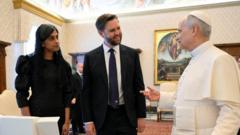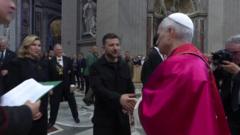Pope Leo XIV, formerly Cardinal Robert Francis Prevost, emerges as a pivotal figure in the Church with strong ties both in the U.S. and Latin America.
New Era Begins with the Election of Pope Leo XIV

New Era Begins with the Election of Pope Leo XIV
Pope Leo XIV's election marks a transformative moment for the Roman Catholic Church, balancing tradition and modernity.
In a surprising outcome, Pope Leo XIV was elected on the second day of the conclave, quickly positioning himself as a unifying force within the Roman Catholic Church. Born in the United States, Leo XIV has spent much of his career dedicated to pastoral work in Peru. His previous role as head of the Pontifical Commission for Latin America under Pope Francis positioned him well for this new responsibility. With a commitment to making the Church's decision-making more accessible to the faithful, he has gained popularity among liberals, while also appealing to conservatives with his solid theological background.
At 69, the new pope strikes a harmonious balance between age and experience, making him a strong candidate in this modern-day papacy. Notably, his American nationality was once regarded as a potential hindrance. Historically, it could have been seen as a conflict of interest with the church’s global image. However, the changing dynamics in geopolitics and the Church's growing inclination to embrace leaders regardless of their nationality appears to have lessened this concern among the 133 cardinals at the conclave.
John Allen, a seasoned Vatican analyst, succinctly remarked, “He checked all the boxes,” noting a shift in how geography and nationality impact the selection of a pope. Ultimately, Pope Leo XIV's election signals a new chapter within the Church, merging tradition with the Church's mission to adapt to a rapidly evolving world.
At 69, the new pope strikes a harmonious balance between age and experience, making him a strong candidate in this modern-day papacy. Notably, his American nationality was once regarded as a potential hindrance. Historically, it could have been seen as a conflict of interest with the church’s global image. However, the changing dynamics in geopolitics and the Church's growing inclination to embrace leaders regardless of their nationality appears to have lessened this concern among the 133 cardinals at the conclave.
John Allen, a seasoned Vatican analyst, succinctly remarked, “He checked all the boxes,” noting a shift in how geography and nationality impact the selection of a pope. Ultimately, Pope Leo XIV's election signals a new chapter within the Church, merging tradition with the Church's mission to adapt to a rapidly evolving world.


















